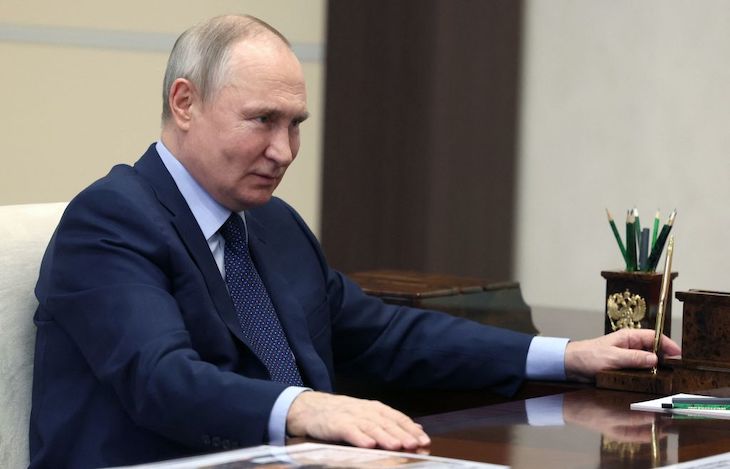There is a certain perverse cachet in one’s words being wilfully distorted by someone who thinks it gives their argument weight. Increasingly, the Russians are adopting this as a tactic. But the target of their disinformation appears not to be foreign audiences, but Russians themselves.
I’ve never really subscribed to the view that being banned from Russia on the charge that I was ‘involved in the deliberate dissemination of false and one-sided information about Russia and events in Ukraine,’ and ‘contributing to fueling Russophobia in British society’ was a badge of honour. It would be tempting to run with it and market myself as ‘the man Putin fears’ or some other grandiose label. But above all, I feel rather sad at being banned from a country that means so much to me. Indeed, I consider myself a much better friend to Russia than those who have lied, embezzled, oppressed and ultimately dragged their people into a stupid and disastrous imperial war.
Still, it is interesting to find myself clearly being not just read by the Russian media but also cited. Once, Russian sites such as InoSMI would run accurate translations of Western articles, even if adorned with acid little commentaries. These days, it is often the case that Russian news outlets will instead offer up doctored versions, slanted to reassure Russians that the West is divided and near collapse and its people unhappy with policy over Russia and Ukraine.
The Kremlin’s propagandists need to find ways to square the circle
They seem to pay a lot of attention to The Spectator (as they should). My recent piece on the Black Sea attracted particular attention, with an especially egregious example in the increasingly nationalist ‘news agency’ Krasnaya Vesna (‘Red Spring’).
The essence of my article was that while we focus on the land war in Ukraine, there is also a naval dimension, with true global significance, as evident through the Russians’ capacity to strangle Ukrainian grain exports by sea, which drove up prices worldwide. Although Crimea’s political future is a complex issue, so long as the peninsula is both Russian-controlled and heavily militarised, then it can disrupt activities in the Black Sea.
Krasnaya Vesna turned this into a piece under the dubious headline ‘Spectator: naval bases in Crimea make Russia stronger than Nato in the Black Sea’. It went on to say that I discussed cases ‘where Nato air forces failed in clashes with Russian fighters,’ which was a creative way to describe my writing about a civilian Polish plane being almost forced into the sea by a Russian jet.
The real zinger came at the end, when Krasnaya Vesna claimed I concluded that because of Crimea ‘Nato countries were staging provocations near the Russian borders.’
Provocations? The closest I come to that is a mention of Western FONOPs — Freedom of Navigation operations — in international waters in the Black Sea, wholly-legal operations that have nonetheless since been paused – unlike the continued presence of Russian warships and spy vessels off the U.S., British and European coasts to this present day. But apparently these don’t count as ‘provocations.’
Of course, disinformation is a tool of war as old as history, but what is interesting is that this kind of misrepresentation, increasingly common these days, is not directed externally. It’s in Russian, for a Russian audience. Furthermore, it’s supplemented by a genre purporting to express Western public mood by selectively culling from online responses – including in The Spectator, where Russia-related articles tend to generate their own distinctively inventive comments. These comments – including those probably written by Russian trolls – then get fed back to Russians. This is part of an attempt to persuade Russians that whatever the globalised elites and other bugbears are doing, the wider public in the West is disenchanted with Ukraine and eager to bring Moscow back in from the cold.
This has become much more of a theme of late. While Vladimir Putin presents his ‘special military operation’ as an heroic struggle against a hostile and hegemonic West, it is clear that most Russians do not want to see themselves as wholly estranged from their European cultural roots. They are unenthused with Putin’s North Koreanising rhetoric. Nor are they happy with the idea that this could become a ‘forever war.’
So the Kremlin’s propagandists need to find ways to square the circle. By manufacturing articles claiming that the ‘real’ West is increasingly disenchanted with the conflict, they provide reassurance that support for Ukraine soon will dwindle, and also that Russia is not out in the cold. That they have to rely on selecting editing and outright fiction to do so, says much about Russia’s real situation.
Got something to add? Join the discussion and comment below.
Get 10 issues for just $10
Subscribe to The Spectator Australia today for the next 10 magazine issues, plus full online access, for just $10.




















Comments
Don't miss out
Join the conversation with other Spectator Australia readers. Subscribe to leave a comment.
SUBSCRIBEAlready a subscriber? Log in